by Ian Fodor-Davis | Jun 26, 2024 | Alberton Gorge, Blackfoot River, Rafting Near Missoula
Whitewater Rafting Near Missoula
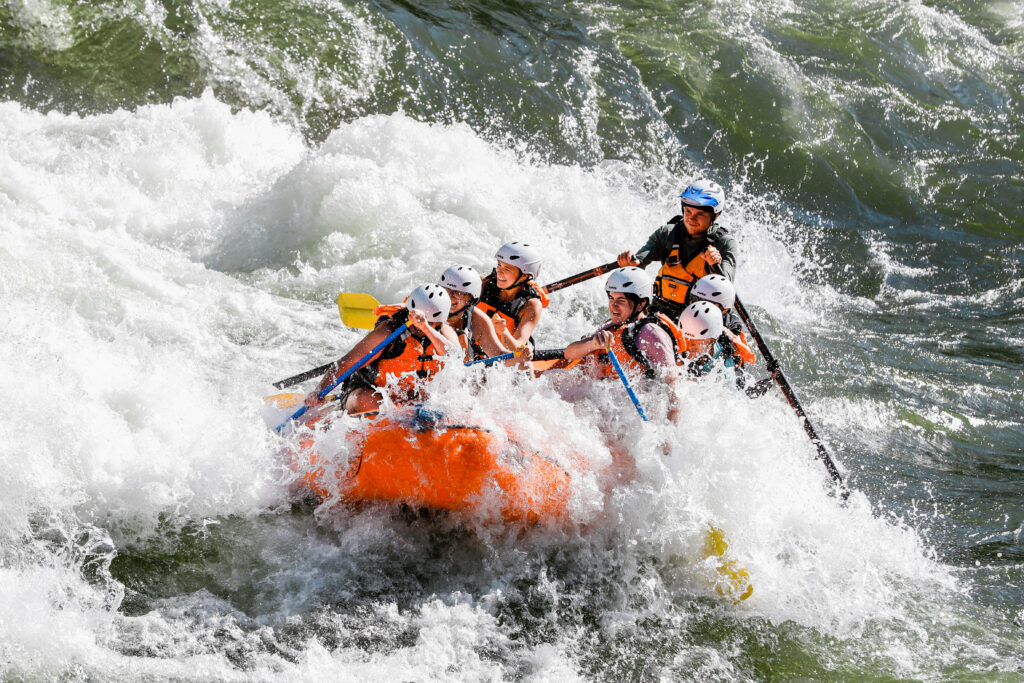
Vacation in Missoula, whoo-hoo! Welcome! We are so glad you’re here. Whether you are trekking to Missoula for the first time, make a yearly trip, or are a long-time local, we have a trip that will fit every group and every adventure level. Whitewater rafting is guaranteed to make your stay more enjoyable, especially on the hottest of days! Rafting in Missoula is one of the absolute best activities you can do on vacation. Read on to get the insider scoop on options for whitewater rafting near Missoula.
Zoo Town Surfers’ River Trips
Zoo Town Surfers has a variety of river trips for all skill levels. If you want something with a bit less adrenaline, we have some fantastic options for you to float through some incredible scenery and experience the area in a new way. Our Scenic and Town Floats provide a wonderful opportunity to experience the area from its incredible rivers.
Missoula Whitewater Rafting & Floats
There is no shortage of whitewater rafting near Missoula! Whether you want a fun adventure for the whole family, a whitewater experience close to Missoula, or an action-packed thrill ride, we have incredible options for you! The Alberton Gorge of the Clark Fork River has big, fun, splashy waves, plenty of spaces to swim and relax, and unforgettable scenery. Now that the water level is dropping the Alberton Gorge becomes the picturesque Montana adventure that every family dreams about. The cool thing is that your raft guide can “pick their line” and customize the trip for your family’s adventure level preferences. What we mean by this is that we can either minimize the rapids experience for you or ramp it up if you want to get an adrenaline rush or two.
Do you already know that you prefer a higher level of adventure? We highly suggest you raft with us in early spring on the Lochsa! The Lochsa River in Idaho is just a bit further south, about two hours, and it will not leave you disappointed. Come prepared to paddle, eat fantastic homemade BBQ, and experience the paddle of a lifetime on one of America’s best roadside whitewater day trips. The Lochsa features Class III & IV rapids, which is the highlight of the trip. A close second? The absolutely delicious homemade BBQ lunch we feed you! No joke, it’s often mentioned by guests as a reason to come back.
Rafting Adventures Near Missoula
The Alberton Gorge
Rafting with kids? Newer to rafting? Bachelor Party? Unsure if whitewater is right for you? The Alberton Gorge on the Clark Fork River is a fantastic place to start! There is a lot of adventure to this river, but what makes it so great is that we can customize the experience for you. During the summer months the Gorge, as we call it, the water levels go down and the fun factor ramps up! This means that you get to enjoy sunshine & splashy rapids with lower intensity. You’ll have the opportunity to discuss your group’s needs with your guide so that they can pick lines that match with your adventure preferences.
For context, The Alberton Gorge on the Clark Fork River (near Missoula) features Class II and Class III rapids.This means:
- Class II (Novice): These rapids have straightforward, clear channels and wide, clear passages. They might have some medium-sized waves but are generally easy to navigate with basic paddling skills. You have a raft guide which helps a lot, too!
- Class III (Intermediate): These rapids are more challenging, with moderate, irregular waves which makes for an exciting, rollercoaster-like experience. They often have eddies and stronger currents, demanding better boat control and some experience in whitewater rafting. Eddy is the calm area by the way!
Overall, the Alberton Gorge provides an exciting but manageable rafting experience suitable for intermediate rafters and adventurous beginners with some guidance.
Alberton Gorge Trip Facts
The Alberton Gorge is known as a pool-and-drop, so you will have plenty of time between the rapids to swim and relax in the sun. In rafting, ‘pool and drop’ is a term used to describe a river characterized by a repeating pattern of calm, deep pools followed by short, steep drops or rapids. This pattern makes for a great rafting experience!
- Pool: The pool is a calm, slow-moving, and deep section of the river. These areas allow for a moment of rest, making them ideal for regrouping and preparing for the next set of rapids. Pools are generally safe and provide an opportunity to enjoy the scenery and revel in the excitement of the previous rapid. This is also where you can take photos and laugh with your loved ones.
- Drop: The drop refers to the steep, fast-moving section of the river where the water cascades down over rocks and creates rapids. Drops can vary in difficulty from mild to very challenging, depending on the gradient of the riverbed and the volume of water. Your guide will use skillful navigation on the rapids and they are often the most exciting parts of the rafting trip.
The “pool and drop” pattern can make a river both enjoyable and predictable for rafters. This type of river is commonly found in mountainous regions where the riverbed has a varied gradient, leading to alternating calm and rapid sections.
Lunch Option: On the Gorge we serve our homemade Chicken Bahn Mi sandwich on locally made Le Petite Baguettes. It’s SO tasty, even more so when you’ve been paddling in the sun! Whew, I’m hungry just thinking about this!
Trip Length: We have Alberton Gorge trips ranging from 3-6 hours depending on water flows, so we can get you back to Missoula for your next adventure and fit most folks’ timeframes! You can call us to discus the perfect trip for you. Check out our town trips if you want something in the 1-2 hour range!
Whitewater Rafting Near Missoula
Missoula Town Floats
Floating through downtown Missoula is one of the best ways to experience it. You get a snapshot of the history, culture, and above all, experience the river that is Missoula’s lifeblood. A bit of scenery, a few splashes, and a different perspective of the town make our Missoula Town Floats a wonderful way to experience the vibrancy of Missoula!
About this time of year the ‘tube hatch’ happens, which affectionately refers to a swarm of tubers leisurely floating down the “town section” of the river. While this can be a blast, it can be congested and slow moving, especially on windy. We offer a town rafting trip to help you enjoy a leisurely and scenic float, but with paddles! Your guide can paddle the raft for you and the trip can be done in 1-2 hours. Sightseeing from the river is the best! You have time to enjoy the beauty and the river.
Scenic Rafting On The Blackfoot River
“Eventually, all things merge into one, and a river runs through it” Norman Maclean famously said in the iconic movie A River Runs Through It. Can you guess what he was talking about!? Norman is referencing the beautiful Blackfoot River and our lovely town of Missoula. This reference says it all…
Rafting the Blackfoot River in Montana offers an exhilarating blend of scenic beauty and thrilling rapids. Renowned for its clear waters and stunning landscapes, the Blackfoot River flows through rugged canyons and dense forests, providing a picturesque backdrop for any rafting adventure.
The river features a mix of Class II and Class III rapids, making it accessible for both beginners and more experienced rafters seeking a moderate challenge. Along the way, rafters can enjoy abundant wildlife sightings, including eagles, deer, and even the occasional moose. The Blackfoot River, with its historical significance and natural charm, promises a memorable and invigorating rafting experience in the heart of Montana.
We offer a couple of different scenic float options. The Blackfoot River is our most popular, and for good reason – it is simply stunningly gorgeous. We have seen everything from bears and elk to deer and eagles. The Blackfoot is rich in stunning scenery, small, fun whitewater, history, and geology. This is a great option for anyone looking to experience Montana’s incredible scenery through one of its beautiful waterways.
The Blackfoot season is shorter and based upon water flow levels. This is typically a leisurely and scenic trip. Please call us or check our booking page for the latest info on if the Blackfoot River is in season and available for trips.
The Lochsa River
Whitewater rafting near Missoula also includes an option in Idaho, which is less than two hours away from us. The Lochsa River is a truly special place. It is very rare to have the combination of big water, towering features, stunning views, and incredible food all in one place. Be prepared for the experience of a lifetime and be prepared to want to come back to visit year after year because the Lochsa will leave you wanting more every time!
This river boasts some of the best Class III and IV rapids, offering an adrenaline-pumping adventure for thrill-seekers. The Lochsa’s clear, free-flowing waters wind through a picturesque landscape of lush forests and rugged mountains, providing stunning scenery along the way. Rafters can expect challenging rapids, sharp drops, and the excitement of navigating through powerful currents. In addition to the thrilling ride, the Lochsa River experience is complemented by delicious homemade BBQ lunches, making it a favorite destination for both adventure and culinary delights. Whether you’re an experienced rafter or looking for a high-adventure introduction to whitewater, the Lochsa River promises an unforgettable journey. Join us in late May for the trip of a lifetime!
Book A Trip: Whitewater Rafting Near Missoula
There you have it, folks! There are so many whitewater rafting trips near Missoula that to enjoy! As you can see there are so many options to enjoy whitewater rafting near Missoula. You can visit this page to book an adventure: https://www.zootownsurfers.com or call us for personalized trip planning assistance. We look forward to rafting with you! Let’s make memories that last a lifetime.
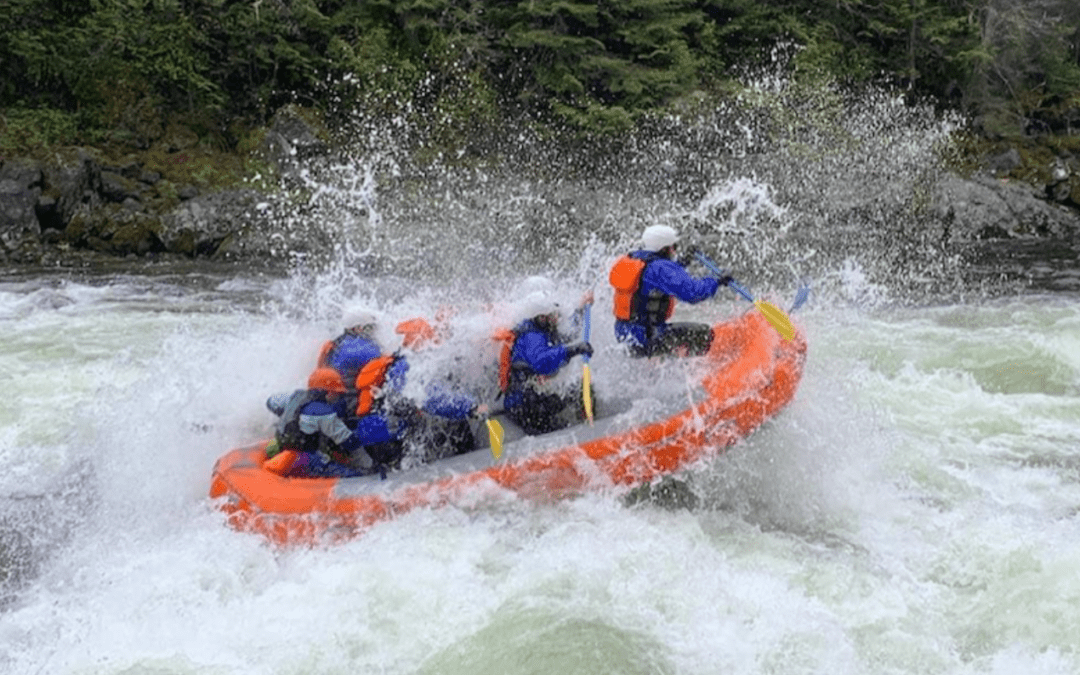
by Ian Fodor-Davis | May 7, 2024 | Lochsa River
6 Reasons To Raft The Lochsa River With Zoo Town Surfers
Don’t miss your chance to experience the thrill of the Lochsa! With a season lasting only 1.5 months, time is limited to raft this incredible waterway. Here are 6 reasons to choose Zoo Town Surfers for your adventure. Lochsa season is short and sweet! Here are 6 reasons to raft with us.
Rafting The Lochsa River
1: Non-Stop Whitewater Action:
Did you know that that the Lochsa spans 30 miles and includes over 40 named rapids? We run guided rafting trips on 10 or 20 mile sections, depending on guests’ preferences. Imagine navigating rapids with names like Ten Pin, Grim Reaper, and Bloody Mary! Get your heart pounding as you conquer Lochsa Falls and House Rapid. This exhilarating adventure will leave you grinning from ear to-ear long after the trip. No wonder we have so many return customers – the Lochsa whitewater experience is simply unmatched!
2: Our Lochsa Guides:
Unforgettable rapids deserve unforgettable guides! Our Lochsa guides aren’t rookies. Our guides are never introduced to the Lochsa as their first river, all guides are required to have a bare minimum of 3 years of commercial full time guiding experience to be considered for the job. Our current team has an average of 6-7 seasons of commercial guiding, with many veterans seeing upwards of 15-20 seasons on the Lochsa alone.
You are in the best of hands with our guides as you run down the Lochsa. And that’s not all: our guides go above and beyond to provide you with an exceptional experience. They are highly-skilled, entertaining and have great stories to share! Their love for the river is part of why they are hired. It’s more than a job, they have a passion for sharing their favorite spots with you!
3: Zoo Town Surfers Safety:
We have a rigorous training program with a heavy emphasis on safety, both on and off the water. Each trip we run will always have safety boats, and as mentioned, our guides are absolutely top notch. In fact, we just finished a multi-day training session on the Lochsa River where our team studied the river, perfected our communication and practiced rescue scenarios.
We never compromise on safeguarding our guests, and always operate as a tight knit team. Our training goes above and beyond the norm in our profession. This includes not only hiring highly-skilled guides, but also investing in extensive training to ensure everyone has the best experience possible. This is something we take pride in offering our guests, and something we encourage you to consider when booking your trip.
4. Our Gear:
We invest in the highest quality equipment available. That’s why we choose top-of-the-line rafts from AIRE Inflatables and the best apparel on the market from NRS. Our equipment is meticulously maintained and stored, ensuring it’s always in peak condition for your adventure. Relax and enjoy the ride. Rafting the Lochsa River with Zoo Town Surfers means you can focus on the breathtaking scenery and exhilarating whitewater. How great is this!? As our guests you don’t have to worry about airing up the raft, transporting it or worry about anything!
But, What About The Food!?
5. Epic River Meal:
Our food is all handmade, from scratch. We have even had some vegans cheat for a day to try our famous BBQ pork and homemade BBQ sauce. With a hot riverside lunch at our private camp, bellies are never empty and you will be recharged after the first half of the trip, to finish your day with the big rapids down river.
6. Our Customer Service:
We pride ourselves on the best customer service around. Want a custom trip? No problem. Want more or less adventure? We will be sure to fit your group with the guide that likes to go big, or the guide that is happy to take a smaller sneak line around the big stuff. Need to find out if the trip is right for you, or have any questions? Just give us a call and we are more than happy to go over any questions you might have, whether you are privately floating or looking to book one of our trips.
You can book trips directly on our website, too! Just follow this link…
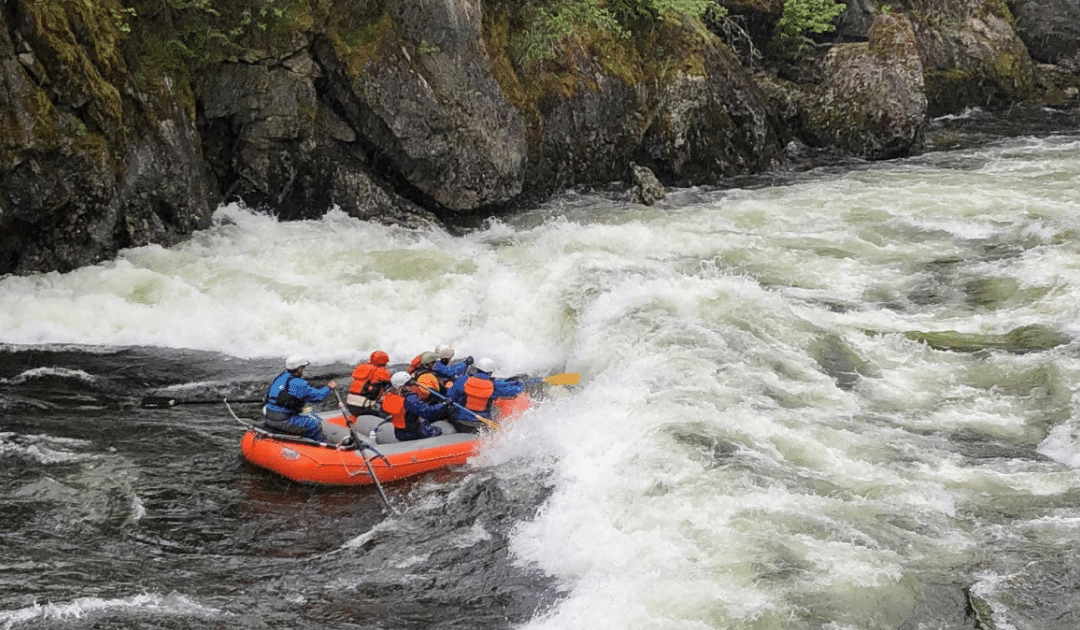
by Ian Fodor-Davis | Apr 16, 2024 | Lochsa River
What Will Conditions Be Like On The Lochsa This Season?
Around this time every year, I get asked the same question; what will flows be like? I usually base my answers off of what snow pack looks like, and when the weather starts to warm up historically. When we have a lighter winter and a lower snowpack, the questions shift to; will we still be able to run the Lochsa? The answer is, absolutely.
While snowpacks are low when compared to the historical average, that does not mean that we have no snow. While snowpacks are low when compared to the historical average, that does not mean that we have no snow. In fact, though we have a low snowpack, there is still plenty of it up at high elevations in the Bitterroots, which drains into the Lochsa. There could, and probably still will be, some high water days. As you can imagine, when the weather gets hot and it rains at the same time, snow melts incredibly quickly. This means we will probably not see every trip launch at the high water mark, but there will likely be trips that see the features the Lochsa is famous for during its short season.
The Best Part Of Low Water Lochsa Boating
The best thing about low water though, is that the Lochsa is still amazing, and delivers a fantastic experience for guests. Lochsa Falls is not quite as ‘big and crunchy’, and there will likely be less carnage during Lochsa Madness, which if you’re hoping to stay in your raft is a great thing! Did you know that every rapid has different features that form only when water levels are lower? Brain Wave in Grim Reaper Rapid is a fantastic example! It disappears as the flows rise to about 9-10,000 cfs. But from 7000 to 9000 cfs or so, it is a spectacular feature, and is one of my favorite hits on the river at all flows.
Did You Know!? Rapids tend to get a bit more technical at lower flows, which means more teamwork and maneuvering may be required. Even at low flows the Lochsa still has a big water feel, and is still an action packed ride in every way.
What You Can Expect On A Lochsa Trip This Season
In reality, what you can expect from the Lochsa on a low water year is pure fun. We may see warmer weather than usual. Safety talks will probably feel a bit less scary. Trips may take a bit longer, and you may see launch locations change a bit from what you remember. That is purely an effort on your outfitters part to keep the trip from running too long. Other than that, whether you book a trip through an outfitter or you have the skillset to privately run the Lochsa, the thing to expect is that you will still be running the Mighty Lochsa. It still requires skill and respect to navigate safely, and you can definitely still expect to crush big waves throughout your trip.
The takeaway here is that The Lochsa River is an absolute blast at lower flows, and we could not be more excited for this season. Some things might feel just a bit different, but in general, it is still the Lochsa, and it is still an absolute kick in the pants. So, this 2024 season, do not let nay sayers and media sources keep you from getting fired up when they talk about low snowpack and low river flows. We will be out there every weekend, and are so excited to see old friends and make new ones on one of the best roadside whitewater trips in America.
Zoo Town Surfers runs commercially-guided trips on the Lochsa River, Clark Fork River and Blackfoot River. We are locally owned and operated and hope you’ll join us for an adventure! Book your trip here or reach out for a personalized trip planning experience.
by Ian Fodor-Davis | Feb 22, 2022 | Uncategorized
Spring flows and Summer floats are right around the corner. If you are a boater, you know this, and are likely getting excited thinking and dreaming. What pieces of gear you may need to upgrade or repair, what lines or rivers you may want to explore, or how excited you are about your first Middle Fork Permit. But this write up is not meant to go into the many details of the Spring boating season or your first multi day trip. Rather, it is meant to explore an intermediary, a temporary solution that many boaters are starting to need right about now.
Winter boating, to me, is that solution. It is somewhat of a different animal in some of the best ways, and in others, some of the scariest. Here are five tips to make your entry into winter boating a bit more comfortable, safe, and fun.
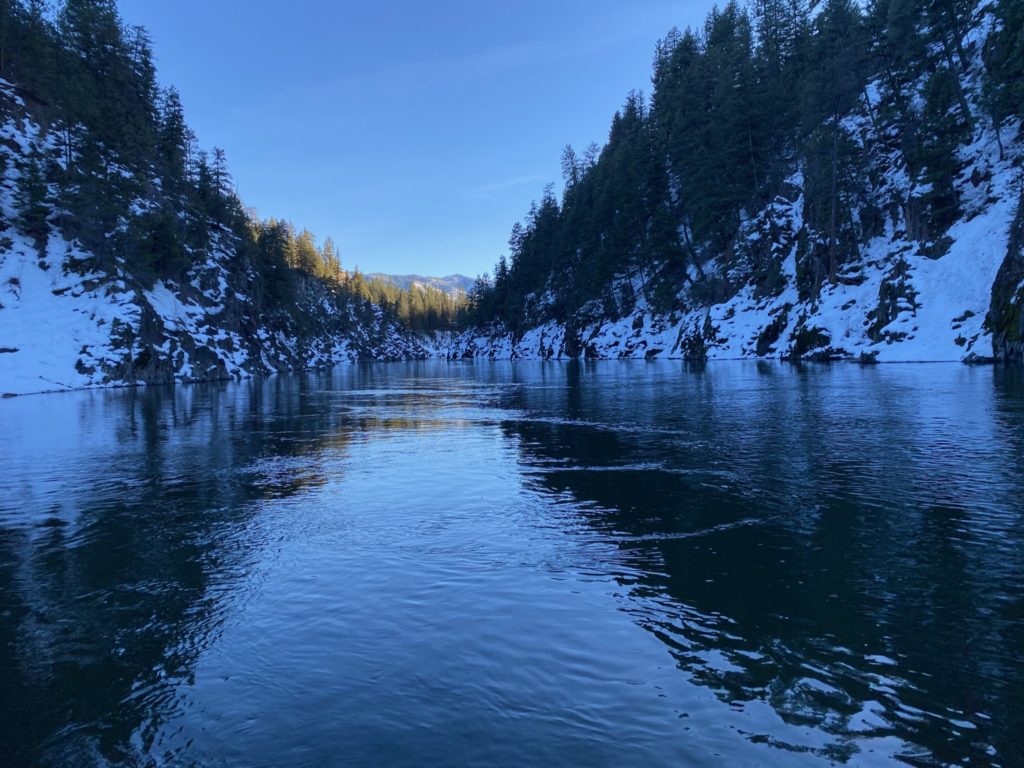
Winter boating can be so peaceful and beautiful
- Perhaps this is the season to avoid the big stuff.
Getting on the water in the winter can be a great time to shake the rust off and just enjoy quiet time on your favorite sections of water (many of which normally have a constant cacophony of voices ricocheting down the sections like the Alberton Gorge). Treat the cold water and weather for what it is. Boat for the joy of it, knowing that this may not necessarily be the time to push the big, consequential lines that have a high chance of sending you swimming. Be extra cautious of hypothermia, and double down on the idea of dressing for the swim, not the weather.
- Along those lines- dress, layer, and gear yourself appropriately.
Winter boating is so peaceful and tends to reignite that love of whitewater that may have been dormant while chasing powder turns and hockey pucks. But it should be viewed as more hazardous, both for yourself, and for any potential rescuers. My general rule of thumb is to dress so that I can stay in the for a minimum of 30 minutes completely comfortably. Dry suits (here for women’s suits) are not just a comfort for boating in the winter, but a mandatory piece of gear for cold water boating. There are many myths about air and water temperature, but the bottom line is that if it is cold water, be prepared for immersion and layer appropriately. My personal cold water layering list: Under my dry suit I wear 2-3 thick fleece layers, 1 lighter moisture wicking layer, and double, sometimes triple wool socks. I use NRS HydroSkin Socks on the outside of my dry suit to protect the booties and add extra warmth. All this insulation for my feet necessitates having a winter set of wet shoes just for my dry suit. In my dry bag I bring along an additional thick layer, a puffy jacket, ski gloves, NRS Maverick waterproof Neoprene gloves, sunscreen, extra wool socks, a warm beanie, a few high calorie snack bars, and a rain shell. Additional Tip: the rain shell is great to eliminate evaporative cooling. Wear it through the whitewater sections and remove it when the sun hits you, or when you get done with the splashes for the day.
- Re-think your necessaries.
Perhaps you have a winter helmet that has ear protection and more insulation. Perhaps you have a PFD you prefer because it has fleece lined hand warming pockets. Whatever your gear and preferences may look like, this is the time of year to double check and re-think whether something is important to have with you on the water. This is the time of year to take extra time to evaluate why something may or may not be needed in your kit. Extra fleece hats and heavily insulated ski gloves may not be in every normal boating kit, but these are definitely nice, perhaps even necessary, for boating in the winter. Leave the sunscreen in your winter kit, remembering that you can still get sunburnt from snow/water glare with no protection. Fully waterproof gloves are great as well, but be warned- once your neoprene gloves are wet, they will likely remain wet for the rest of the day. Keep them in your dry bag for when you get chilly, unless you plan on wearing them all day.
Having something to eat can make all of the difference between a lovely day and a harrowing brush with hanger. Your caloric intake will need to be higher as your body is working to keep you warm, so bring some extra snacks. I love bringing a 64 oz Hydro Flask of hot tea as well, as it’s a glorious treat on those shady afternoons when you are starting to get chilled. Bring along warm food if possible, but warm or cold extra snacks will help keep you warm and comfortable, as well as stay safe. Proper caloric intake enables you to think clearly, and to deal more effectively with stressful situations and emergencies.
This will seem like a reiteration, and to be fair, it is. But safety of you and your party is the number one thing to pay attention to. If the weather seems like it may cause problems, perhaps wait until the next sunny day. If the flows are spiking above your comfort level, winter is not the time to push that comfort level. Have an evacuation plan and a hypo kit, especially if you are in a remote setting. Have extra gear for your friends and yourself. After all, you would rather have an extra set of gloves than deal with a horrific upstream wind that results in frostbite without them.
Winter Boating can and should be fun. There are many things to note about staying safe, comfortable, and therefore happy on winter boating trips. These are just a few, and this is in no way an exhaustive effort to cover all safety tips. Hopefully though, this will help get you started, or serve as a reminder should you already be a winter boating fanatic.
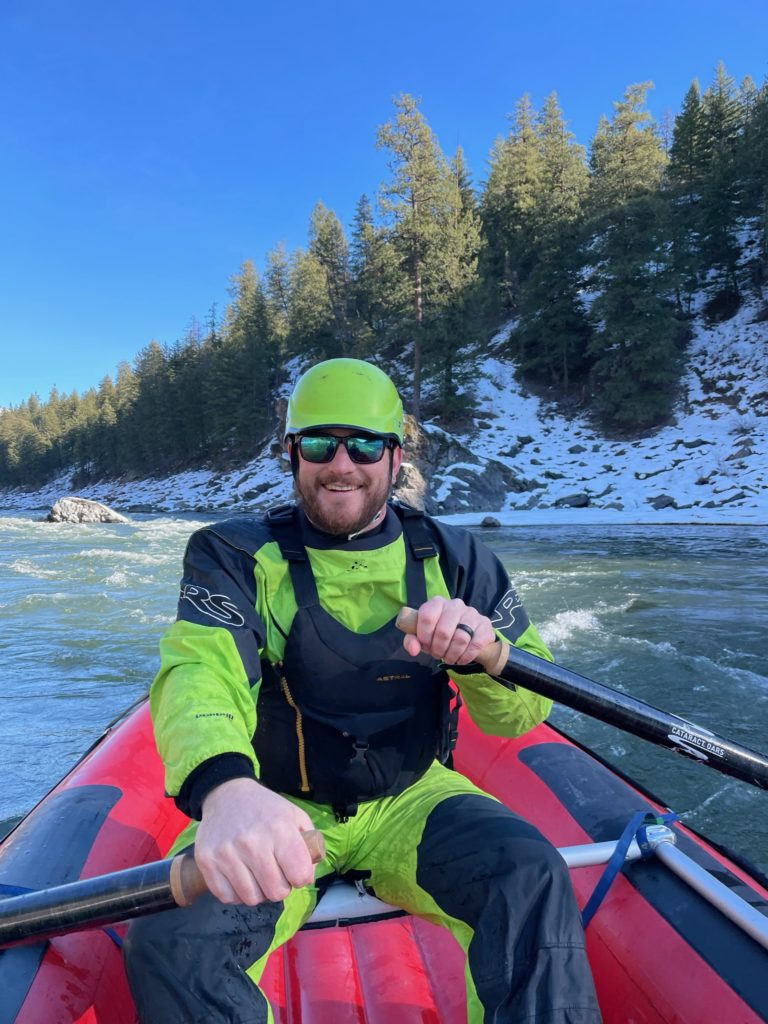
Ian staying warm, and thus very happy, on a recent lap.
We just got out to get some winter laps in ourselves, and we sure are getting excited for the upcoming season around here. Visit www.zootownsurfers.com to get your booking secured for the season.
Stay safe and warm out there, and I hope to see you on the water soon!
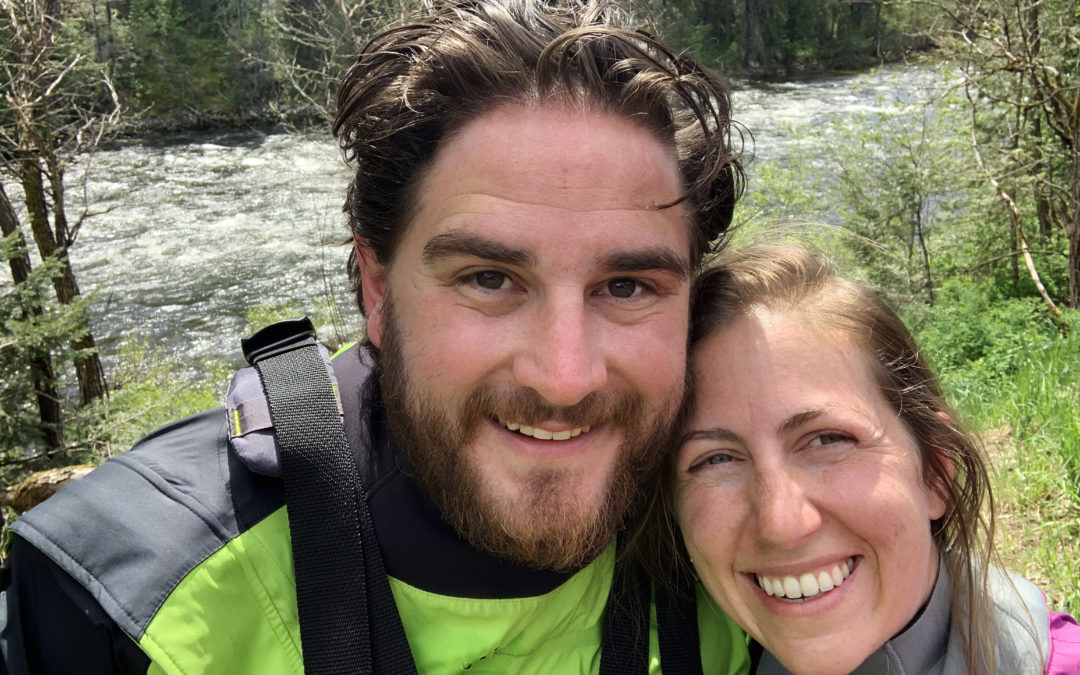
by Ian Fodor-Davis | Jan 20, 2022 | Blackfoot River, Guide Blog, Lochsa River, River Surfing
What an honor it is to be writing this and introducing ourselves to all of our future friends, employees, coworkers, partners and customers. Megan and I are so incredibly grateful for the opportunity to do what we love to do, serve our community, as well as educate and find stewards, or build upon existing ones. This truly is a dream come true. First, we must thank Jason Shreder again for this opportunity. We will do everything we can to ensure the continued growth and prosperity of the business you started, my friend. Thank you. I will try to keep this brief, but I am not known for that talent. Here is a bit about us, and our journey to Zoo Town Surfers.
Ever since I was young, I have been fascinated and drawn to water. I have a picture floating around somewhere of me, around 2 years old, standing next to some rafts my parents had rented for a Green River multiday. Since then, water and rafting has been in my blood.
I grew up never being able to get out the ocean, spending much of every summer in Southern California with family. The same was true when I was home in Idaho on it’s rivers and lakes; I was the first one in the water, and the last one out, and that much of me at least, largely remains true to this day.
Megan similarly always loved the water. She grew up snowboarding on the frozen kind, and playing on the wet kind in various river and fishing trips with her family in Alaska. Her love of rivers grew dramatically when she hopped on her first multiday trip with me back in college on the Lower Gorge of the Salmon River. Since then, she’s taken every opportunity to be on the water. The Lochsa is one of her favorite places on the planet, and in her words, where she “truly fell in love with rivers.”
7 years ago, Megan asked me whether or not I would ever want to own an outfitting business. My work in guiding on the Salmon and Hells Canyon led me to work as a rep for the absolutely wonderful folks at Northwest River Supplies (NRS), so the question of owning a river business came up pretty frequently. My answer was invariably; it depends on the business. I would not want to do it for the wrong reasons, and I would want to structure a company that I would be happy to guide at. One that focuses on guide voice, stewardship, individual and professional growth, and sharing our incredible rivers with those that do not get to experience them as often as we do. One example of this type of business came up as a general answer to Megans question; if Jason Shreder ever decided to sell, that would be a business worth purchasing. As luck would have it; 7 years, a few moves, and many river trips later, as well as right place at the right time and some good friends, would lead us to start the process of purchasing Zoo Town Surfers.
We could tell from the get-go that Shreder’s involvement in the community and his passion for his business was incredible. He built this business from the ground up, and we want to continue the traditions, hard work, and community care and involvement that he set the foundations of ZTS on. That seemed a daunting task at first, but it has become much more achievable and exciting as we have seen how much love and support has been built around ZTS. Our promise to you is this: We will continue to grow ZTS into a community minded, inclusive, and safe place where any and all can experience the river.
I am always available via email at ian@zootownsurfers.com, and phone at 208-310-2253. I would love the opportunity to introduce myself over a cup of coffee or a beer, please feel free to reach out! Thank you all for taking the time to read this far, and we hope to see you on the river!
Cheers,
-Megan and Ian Fodor-Davis.






